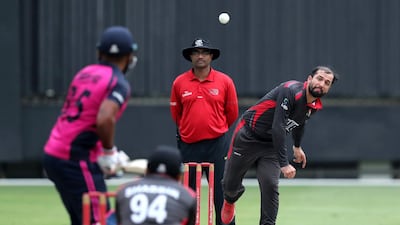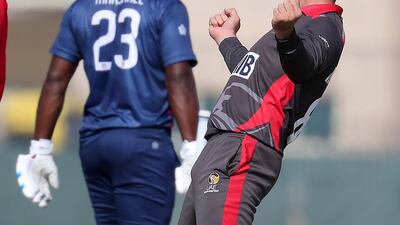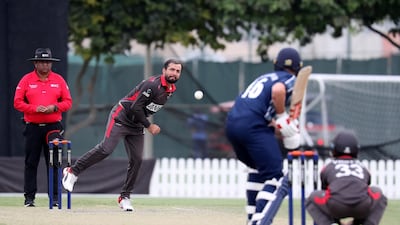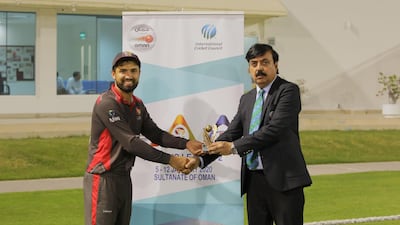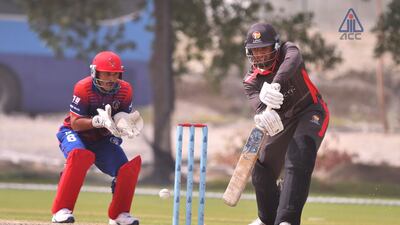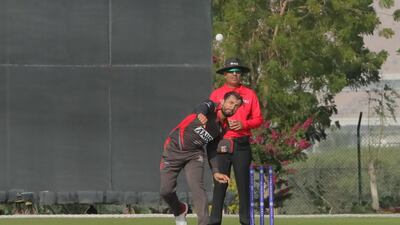Since coronavirus stopped play, cricketers across the world – like most people – have had to find new ways to entertain themselves.
Some will have coped with the absence of the game better than others.
It is safe to assume Rohan Mustafa, the UAE allrounder, will be among those pining most for its return. "It is just like food for me," he said.
Cricket has defined the 31-year-old’s life so far. This is somebody who was once deported because of a cricket issue. Who later lost the national captaincy after letting his emotions get the better of him having felt wronged by the game. And who now uses his success in the sport as a means to support others.
It has become customary in recent times for Mustafa to divert any rewards he gets from excelling – either man of the match or player of the tournament awards – to others.
Groundstaff here in the UAE, cleaning staff at grounds in Nepal, and underprivileged children in Pakistan are among those who have benefitted from his benevolence.
Mustafa regards it as doing his father’s work. Mustafa Kamal died when his son was just 15, meaning he missed him flourishing into an international cricketer of substance.
“I swear by Allah, whenever I play or I get man of the match, he comes into my mind,” Mustafa said of his father.
“I just wish he was here to watch me and see. He loved to help poor people. That’s what I try to do in his memory when I have success.”
It wasn’t always like this. There was a time, with his father no longer around, Mustafa needed all he could make from the game to feed himself and his family.
That was what brought about the dispute that saw him, briefly, ejected from the country for absconding from duty.
He played cricket for another rival side for a few extra dirhams, without permission from his then employers.
Troubled
Mustafa says he has few regrets – neither that issue, nor the suspension he later received for making public criticism of a tournament in Pakistan, which cost him the UAE captaincy at the end of 2018.
One thing he does say, though, is that his pursuit of more and more matches early in his career – in order to make funds to cover living costs – affected his game.
“I believe I would be a better player if I hadn’t played cement cricket, or I had played better domestic cricket,” he said. “But at that time I was struggling to earn a living.”
His technique may be homespun, but it has brought him plenty of success, increasingly so in recent times when he has been the talisman of the troubled national team.
He first worked out a method for success as a child in Kohat in northern Pakistan, when he learnt the rudiments of the game from his brother and cousin.
“Both are elder then me, so it was hard to get them out and when I batted it was hard to survive," Mustafa said.
He had the chance to play just one formal cricket match before upping sticks to Sharjah with his father, who had a car sales business in the city.
“They gave me batting in the end I scored 25 not out,” he said.
“One of the good players in Kohat told me, ‘You will play for Pakistan if you work hard’. He wasn’t aware I was going to UAE.”
Friendly
When he did arrive in his new country, he says he had no problems settling in.
Sharjah Cricket Stadium was just down the road, and he remembers going along to watch a Test between Pakistan and Australia in 2002, when he was 13.
They lived near the ground, and he attended Pakistan Islamia School, which is less than 2km from the front entrance to the stadium.
"I was friendly, so it was not hard for me to make friends," Mustafa said of settling in Sharjah.
"I was a very well-known player in my school time, because I used to score a lot of runs, and they used to respect me for it."
He graduated to the senior national team in 2007, and has been a fixture of the side for most of the times since.
Mustafa has two favourite memories of his career so far. They could scarcely be more different.
The first is of playing in Nepal, where he has been a much-loved overseas player in various franchise leagues in recent years.
The other is of walking out to bat at the MCG in a warm up match ahead of the 2015 World Cup, and taking one of the game’s most feared fast bowlers for four.
“When we went to play the World Cup, our first practice match was against Australia at the MCG,” Mustafa said.
“When I entered the MCG, it is such a huge ground it just felt, like, wow. Playing against Australia, and then facing Mitchell Johnson hitting him for boundary was a great thrill."
Limiting the World Cup to just 10 teams mean the UAE have got their work cut out in returning to the competition, but Mustafa is hopeful.
“I played in the World Cup 2015, but now it’s a different feeling,” he said.
“I want to qualify my team again for next World Cup.”

